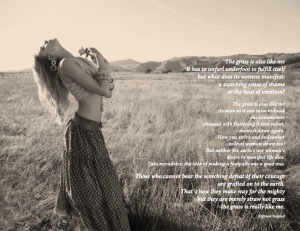The grass is also like me: multiple “natural” truths
(medium: photo composition, response: week 12)
“The grass is also like me” and other poems by Kishwar Naheed, the Pakistani feminist poet (here translated by Rukhsana Ahmad), speak to the reader/listener both politically and emotionally. Ahmad makes the argument in her introduction to We Sinful Women: Contemporary Urdu Feminist Poetry that this Urdu poetry departs from many of the traditions of the classic ghazal, but I believe that resonant image clusters do remain a significant part of Naheed’s poetry. In this very poem, the images of the self as nature/yearning/seeking the inaccessible are utilized. However, compared to the mystical, disjointed nature of the ghazal, these images refer to a political reality more than a personal relationship with God, and the metaphors are elongated and elaborated. It is the subversion of that literary form, though, not the eschewing of it wholesale, that produces such a powerful effect. Kishwar’s poetry harkens to a sense of colonial patriarchy that is carried forth in new, reproduced and re-sourced contemporary manifestations, under religious justifications that hold no logical weight. It is the ‘natural’ and intrinsic justice to which she calls in order to make her point; read here in the drama of the photo composition.
The “woman in nature” that Naheed imagines is entirely separate from her completely unnatural, “civilized” or “Islamicized” position in Pakistani society. In fact, in these political institutions of certain forms of dress, purdah she is intentionally erased by such corruptions of “what we imagine as nature.” Naheed picks apart the claims and knowledge production that attempt to naturalize the subordination of women in powerful, extended metaphors of competing truths of nature.
This poem drew at me separately from the poetry we read excerpted from the collection We Sinful Women: Contemporary Urdu Feminist Poetry for Week 12, because of the use of nature and the analogy with women – the process of denaturalizing supposedly innate systems of domination is at the heart of feminist deconstruction. It is for this reason that I chose the nature metaphor, over the scathing critique and satire of the poem “We Sinful Women” (p 31). I believe that this poem denaturalizes domination without offering an essentialist vision of ‘female unity,’ a difficult achievement in the ambiguous, porous boundaries of poetry – but part of my own interpretation. I intend for the photo composition here to reflect some of this, and to appeal to the same metaphor as the text, offering multiple possible truths and thus disrupting the monolithic representation of a ‘female nature’ that needs to be civilized/subordinated using decontextualized religious justifications/politically managed.


Aw, this was a really nice post. In concept I want to put in writing like this additionally – taking time and actual effort to make an excellent article… but what can I say… I procrastinate alot and by no means seem to get one thing done.
Evangelina Borreta said this on December 5th, 2018 at 2:11 am